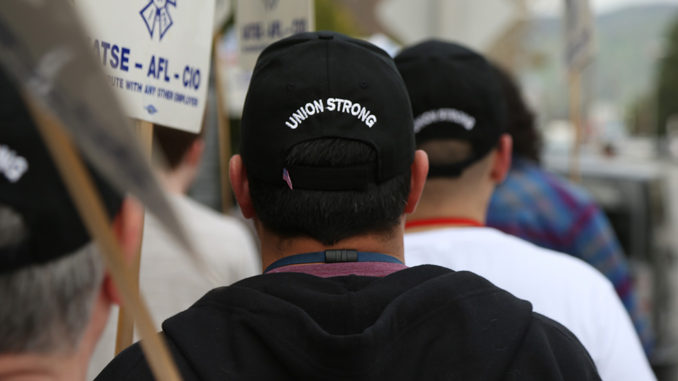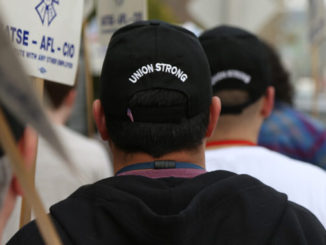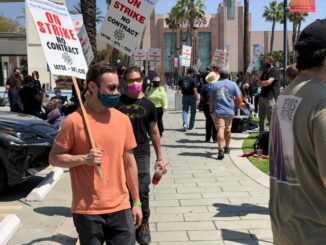
by Tris Carpenter

On an early morning in April, I found myself speaking to a graduate class at the American Film Institute about the role of the IATSE and the Editors Guild. Phil Linson, a member of ours and the vice dean of the Production and Post-Production department there, had asked that I come speak with his class of students, who will be receiving Master of Fine Arts degrees this summer (if their grades hold up, I suppose).
Most of the students had already done some editorial work out in the “real world” and one was even a member of Local 700 already. But for all their familiarity with editing and the business, many were quite unfamiliar with what a union is and how it functions. Rob Callahan, our organizer in the Los Angeles office who assisted me in my presentation, saw what was going on. He took a few steps back and explained to the class that unions are, in essence, agreements between people to protect each other and not to undercut one another––and that these agreements to work together are the force and leverage behind the benefits and conditions that get codified in the contracts that we hammer out with employers.
A few hours later, that comment got me thinking about the roles and responsibilities of the various people who make up our union.
In a nutshell, the Guild staff has a responsibility to the members to advocate for them when needed, and to provide strategic insight for negotiating contracts and organizing new employers. Ultimately, though, staff can’t take the place of the membership. That means you have a role, too.
If you’re like most people, you’re thinking, “Yeah, my job is to pay my dues every quarter.” But really, it goes far beyond that. In fact, I sometimes wonder if the very fact that members write a check every three months sometimes makes them think that they’ve done their part. Not even close.
What’s your role? To honor those efforts, and to make sure that the achievements by your forebearers aren’t killed off by a death of a thousand cuts.
Take a look back at the history of the unions in this business. The issues that got the motion picture industry unions going were, indeed, quite basic: Meal breaks. Turnaround. Weekends. These are all issues that were resolved by people working together when their employers refused to deal fairly. Over time, the unions added to their basic issues more involved and more complicated benefits–– like health insurance and pensions.
But none of these items (which so many take for granted) was a gift or some symbol of the beneficence of the studios. They were fought for by your predecessors. For some of you, those fighters are the nameless and faceless pioneers and practitioners of your craft. For others who “grew up in the biz,” those fighters are your parents and grandparents. In either case, they were real fights, waged by real people who made real efforts and sacrifices to gain those protections and benefits. Sometimes, they had to fight hard to hang onto those benefits after they were won. These souls made this heroic effort, not only for themselves, but also for those who came after them.
And that brings me to you.
What’s your role? To honor those efforts, and to make sure that the achievements by your forebearers aren’t killed off by a death of a thousand cuts. Sometimes that means simple stuff: making sure that you get your overtime, putting in for meal penalties, etc. Sometimes it’s more complicated, like calling in non-union jobs, helping the organizers make contact with people who aren’t members, explaining the benefits of working union to those who are interested.
And, just like your predecessors, you need to do this not only for yourself, but for the people that will follow you as well.
Put quite simply, your responsibility goes beyond paying dues. It’s never been that simple, and the fact that we still have a strong contract today is a testament to the fact that other people before you understood that their role was more than writing a check.
So, let me ask, where do you want to begin?





